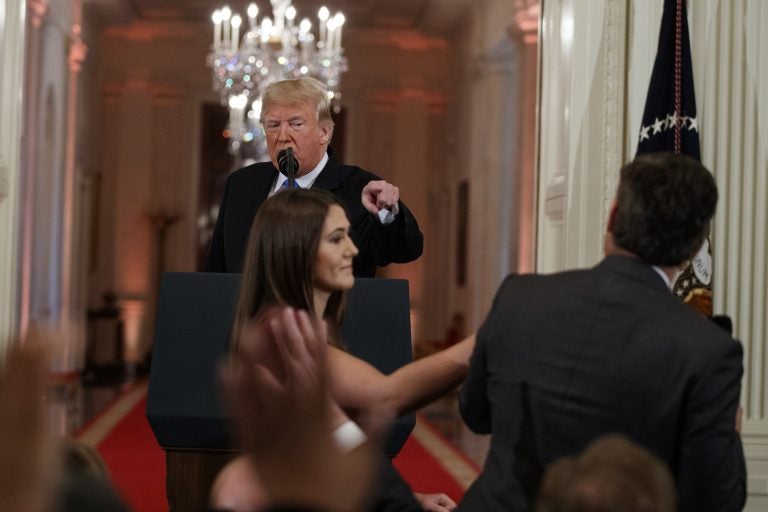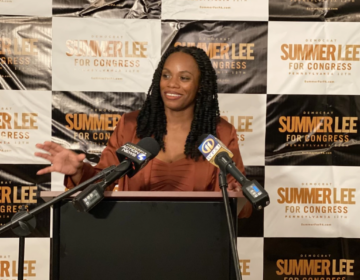CNN’s historic lawsuit against Trump strikes a blow for the free press

President Donald Trump looks on as a White House aide attempts to take away a microphone from CNN journalist Jim Acosta during a news conference in the East Room of the White House, Wednesday, Nov. 7, 2018, in Washington. (Evan Vucci/AP Photo)
Floyd Abrams, one of our foremost First Amendment lawyers, told me during the summer that the free and independent American press is under attack as never before, that Donald Trump’s war on objective reality is an unparalleled authoritarian threat. We’ve long known this, of course, but Abrams’ credentials lend weight to his words:
“No president in our history has been as unremittingly hostile … If news is ‘fake’ not because it is untrue but because it is insufficiently supportive of him, the very relevance of truth-telling becomes at risk … It too easily can lead to an ignorant public led by a repressive regime.”
That’s why we should applaud CNN’s historic decision to sue Trump in federal court. Trump’s angry yanking of Jim Acosta’s press pass (coupled with Trump’s Soviet-style denunciation of Acosta, on national TV, as an “enemy of the people”), was an unprecedented act by a president who has no clue about the Constitution. His rash act deserved an unprecedented response — a forceful pushback from the free press that was long overdue.
I get why Trump was so upset at his post-election news conference. He hates to lose, and the midterm results had exposed him as a loser. Thanks to him, the GOP lost the House of Representatives — and, indeed, one week later, those elections are not over yet. At last check, Democrats are on track to flip as many as 39 seats, their best House midterm performance since the ’74 elections after Watergate, and thanks to their wins on traditional GOP suburban turf in a slew of red states, they’ve beaten the House GOP candidates by nearly eight million votes nationwide. These trend lines were already apparent last Wednesday when Trump lost his cool with Acosta. Hours later, without warning, Trump terminated Acosta’s access to the White House.
The stakes in this episode should be obvious. Journalists covering the White House are not trying to win any popularity contests. Their job is to pose tough, inconvenient, and often annoying questions to the people in power. If they have to fear that an unfriendly question will get them kicked out of the building — let Acosta’s banishment be a lesson! — the resultant chilling effect will inhibit them from doing their constitutionally-protected work. That’s why CNN, in federal district court, is contending, with ample substantiation, that the revocation of Acosta’s press pass violates the First Amendment (freedom of the press) and the Fifth Amendment (the right of due process, which he was denied). It seeks the immediate restoration of his White House pass.
This statement yesterday, from the lawyer whose signature tops the CNN lawsuit, frames the issue to perfection: “The Supreme Court has held in no uncertain terms that the First Amendment protects ‘robust political debate,’ including ‘speech that is critical of those who hold public office.’ Mr. Acosta’s press credentials must be restored so that all members of the press know they will remain free to ask tough questions.”
The lawyer’s name is Theodore “Ted” Olson. This is the same Ted Olson who helped create the conservative Federalist Society. The same Ted Olson who argued the Bush side in Bush v. Gore. The same Ted Olson who served Bush as U.S. Solicitor General in front of the Supreme Court. The same Ted Olson who represented a Clinton-hating conservative magazine during the ’90s. And, most deliciously, this is the same Ted Olson who Trump tried and failed to hire earlier this year as a member of his legal team.
All of which makes Olson the ideal lawyer to defend the free press and take the fight to the demagogue. He understands that true conservatives respect judicial precedent; therefore, the lawsuit quotes the precedent set by the Supreme Court in its 1964 ruling Times v. Sullivan. In the high court’s words, the Founding Fathers forged a “profound national commitment to the principle that debate on public issues should be uninhibited, robust, and wide open, and that it well may include vehement, caustic, and sometimes unpleasantly sharp attacks on government and public officials.”
And according to a 1977 federal district court decision, access to White House press facilities cannot “be denied arbitrarily, or for less than compelling reasons.” The court, which ruled in favor of journalist Robert Sherrill, who’d been arbitrarily denied a press pass, decreed in its opinion that if a member of the press is barred from the White House, that person shall be given “factual bases for denial” as spelled out in “a written decision.” The barred journalist also shall be given “an opportunity to rebut.” In other words, due process as guaranteed by the Fifth Amendment. Acosta was denied any such process.
I’ll take a wild guess that Trump was unfamiliar with the precedents set in Times v. Sullivan and Sherrill v. Knight. If he has adequately schooled himself in the law, perhaps he wouldn’t be offering such lame defenses. First up was a doctored video that purported to show Acosta laying hands upon the White House staffer who was trying to snatch his hand-held mic. When that didn’t fly, Trump (via Sarah Huckabee Sanders) said that Acosta failed “to treat the White House with respect,” and that his behavior toward Trump was “neither appropriate nor professional.” Those highly elastic rationalizations could be used to bar virtually any journalist for any reason Trump deems fit — if left unchecked by the defenders of freedom, in the press and in the courts.
Hence the CNN lawsuit. With his midterm losses still mounting, and with Robert Mueller’s sleuths still circling, Trump is now a wounded animal — which makes it all the more imperative to counter his authoritarian impulses. As the high court justices warned in 1964, “the pall of fear and timidity, imposed upon those who would give voice to public criticism, is an atmosphere in which the First Amendment freedoms cannot survive.”
WHYY is your source for fact-based, in-depth journalism and information. As a nonprofit organization, we rely on financial support from readers like you. Please give today.




